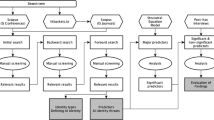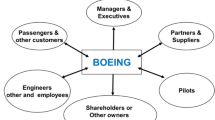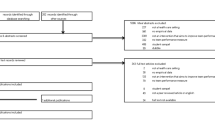Abstract
Common characteristics of crisis situations are ambiguous and unplanned for events. The need for improvised roles can therefore be an imperative factor for the success of an operation. The aim of this study is to deepen the understanding of the processes taking place during improvised work “as it happens”. A case study of a crisis management team at work is presented and provides an in-depth analysis of the information and communication flow of persons acting in improvised roles, including contextual factors influencing the task at hand. The analysis suggests that three main factors lay behind decreased performance by the team when some of its members were forced to take on roles for which they lacked professional training; lack of language skills, lack of domain knowledge and insufficient organizational structure of the tasks. Based on the observations from this case study, we suggest three ways of improving a team’s performance and hence resilience when forced to improvise due to lack of personnel in one or more required competence areas. These are training to take on the responsibility for tasks or roles outside ones professional area of specialization, developing formal routines for changes in roles and tasks and developing and using tools and routines for information sharing.




Similar content being viewed by others
Notes
More information on CITE Explorer can be found at http://www.vsl.se
Scott is a website where equipment for fire fighters is sold.
All translations are from Swedish to English and are performed by the first author.
Qualcomm is an area in California, according to the scenario one of the evacuation centers was located here.
References
Aminoff H, Johansson B, Trnka J (2007) Understanding coordination in emergency responses. Proceedings of the EAM Europe annual conference on Hum Decis-Mak and manual control. Lyngby, DK
Artman H (2000) Team situation assessment and information distribution. Ergon 43(8):1111–1128
Chelariu C, Johnston WJ, Young L (2003) Learning to improvise, improvising to learn, a process of responding to complex environments. J Bus Res 55:141–147
Crossan M (1998) Improvisation in action. Oper Res 5:593–600
Crossan M, Sorrenti M (2002) Making sense of improvisation. In: Kamoche K, Cunha M, Cunha J (eds) Organizational improvisation. Routledge, London, pp 29–51
Cunha M, Cuhna J, Kamoche K (1999) Organizational improvisation: what, when, how and why. Int J Manag Rev 1:299–341. doi:10.1111/1468-2370.00017
Drabek TE, McEntire DA (2002) Emergent phenomena and multiorganizational coordination in disasters: lessons from research literature. Int J Mass Emerg Disasters 20:197–224
Drabek TE, McEntire DA (2003) Emergent phenomena and the sociology of a disaster: lessons, trends and opportunities from the research literature. Disaster Prev Manag 12:97–112. doi:10.1108/09653560310474214
Fussell S, Kraut E, Lerch F, Scherlis W, McNally M, Cadiz J (1998) Proceedings of the 1998 ACM conference on computer supported cooperative work. New York
Grøtan T, Størseth F, Skjerve A (2008) Resilience, adaptation and improvisation—increasing resilience by organising for successful improvisation. Proceedings of the 3rd symposium on resilience engineering. Antibes-Juan Les Pines, France
Hollnagel E (2006) Resilience—the challenge of the unstable. In: Hollnagel E, Woods D, Leveson N (eds) Resilinece engineering: concepts and precepts. Ashgate, UK, pp 1–18
Hollnagel E (2009) The four cornerstones of resilience engineering. In: Nemeth C, Hollnagel E, Dekker S (eds) Resilience engineering perspectives: preparation and restoration. Ashgate, Burlington, pp 117–133
Hollnagel E, Woods D (2005) Joint cognitive systems: foundations of cognitive systems engineering. Group. CRC Press, Taylor & Francis Group, Boca Ranton
Hollnagel E, Woods D (2006) Resilience engineering: concepts and percepts. Ashgate, UK
Johansson B, Hollnagel E (2007) Pre-requisites for large scale coordination. Cogn Technol Work 9:5–13
Kamoche K (2003) Toward a theory of organizational improvisation: looking beyond the Jazz Metaphore. J Manag Stud 40:2023–2051. doi:10.1046/j.1467-6486.2003.00410.x
Kendra J, Wachtendorf T (2006) Improvisation, creativity and the art of emergency management. DRC Preliminary Paper 357. Newark: DE: Disaster Research Center, University of Delaware
Korolija N, Linell P (1996) Episodes: coding and analyzing coherence in multiparty conversations. Linköping University, Linköping
Kreps G, Bosworth S (2006) Organisational adaptation to disaster. In: Rodriguez H, Quarantelli E, Dynes R (eds) Handbook of disaster research. Springer, New York, pp 297–315
Kulling P, Sigurdsson S, Hamberger B (2008) KAMEDO report no. 92: evacuation of Swedes from Lebanon—observational studies in connection with the War in Lebanon in summer 2006. Prehosp Disaster Med 23:376–480
Larsson P (2008) Prepared to go anywhere. Swedish Rescue Services Agency, SE
Lundberg J, Johansson B (2006) Resilinece, stability and requisite interpretation in accident investigations. 2nd symposium on resilience engineering, Antibes-Juan-les-Pins, France
Manyena SB (2006) The concept of resilience revisited. Disasters 30:434–450. doi:10.1111/j.0361-3666.2006.00331.x
Medonça D, Fiedrich F (2006) Training for improvisation in emergency management. Int J Emerg Manag 3:348–363
Medonça D, Beroggi G, Wallace W (2001) Decision support for improvisation during emergency response operations. Int J Emerg Manag 1:30–38
Medonça D, Beroggi G, Wallace W (2003) Evaluation support for improvisation in simulated emergency scenarios. 36th Hawaii international conference system science big Island, HI
Mendonça D, Wallace W (2006) Adaptive capacity: electric power restoration in New York City following the 11 Sep 2001 attacks. Paper presented at the 2nd resilience engineering symposium, Antibes-Juan-Les-Pins, France
Mendonça D, Wallace W (2007) A cognitive model of improvisation in emergency management. IEEE Trans Syst Man Cybern 37:547–561
Moorman C, Miner A (1998) Organizational improvisation and organizational memory. Acad Manag Rev 23:698–723
Parisi CR, Salas E, Cannon-Bowers JA (2000) Teamwork in multi-person systems, a review and analysis. Ergon 43:1052–1075
Patterson E, Woods D, Cook R, Rendel M (2007) Collaborative cross-checking to enhance resilience. Cogn Technol Work 9:155–162
Rankin A (2009) Rollimprovisation vid Responsinsatser. Master thesis, Linköping University (In Swedish)
Rankin A, Kovordanyi R, Eriksson H (2010) Episode analysis for evaluating response operations and identifying training needs. Presented at NordiCHI, Reykjavik, Iceland
Salas E, Fiore SM (eds) (2004) Team cognition: understanding the factors that drive process and performance. American Psychological Association, Washington, DC, p 268
Smith P, Blandford A, Back J (2009) Questioning, exploring, narrating and playing in the control room to maintain system safety. Cogn Technol Work 11:279–291
Somers S (2009) Measuring resilience potential: an adaptive strategy for organizational crisis planning. J Contingencies Crisis Manag 17:12–23
Trnka J (2009) Exploring tactical command and control. Dissertaion, Linköping University
Trnka J, Johansson B (2009) Collaborative command and control practice: adaptation, self-regulation and supporting behavior. Int J Inf Syst Crisis Response Manag 1(2):47–67
Vera D, Crossan M (2004) Theatrical improvisation: lessons for organizations. Organ Stud 16:203–224
Vera D, Crossan M (2005) Improvisation and innovation performance in teams. Organ Sci 16:203–224
Webb G (2004) Role improvisation during crises situations. Int J Emerg Manag 2:47–61
Webb GR, Chevreau FR (2006) Planning to improvise: the importance of creativity and flexibility in crisis response. Int J Emerg Manag 3(1):66–72
Webb GR, McMichael M, Noon J, Patterson T (1999) Role improvisation under conditions of uncertainty: a classification of types. University of Delaware, Newark, DE
Woods D (2006) Essential characteristics of resilience. In: Hollnagel E, Woods D, Leveson N (eds) Resilience engineering: concepts and precepts. Ashgate, Aldershot, pp 21–34
Acknowledgments
The authors would like to thank Jiri Trnka, FOI, Sweden, for preparing and realising the role-playing exercise and David Mendonça for his valuable comments and suggestion on an early version of this paper. We would also like to thank the participants from the SRT. Funding from the Swedish Civil Contingencies Agency is gratefully acknowledged. We also thank the reviewers of a previous version of the paper for their constructive comments.
Author information
Authors and Affiliations
Corresponding author
Rights and permissions
About this article
Cite this article
Rankin, A., Dahlbäck, N. & Lundberg, J. A case study of factor influencing role improvisation in crisis response teams. Cogn Tech Work 15, 79–93 (2013). https://doi.org/10.1007/s10111-011-0186-3
Received:
Accepted:
Published:
Issue Date:
DOI: https://doi.org/10.1007/s10111-011-0186-3




